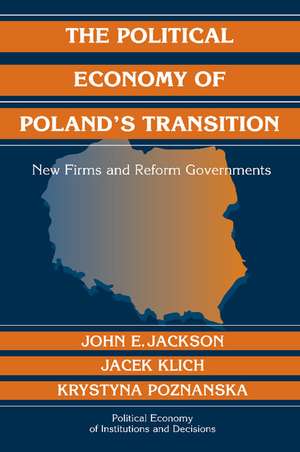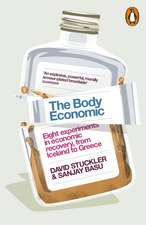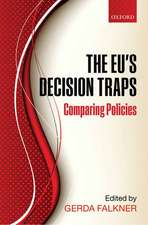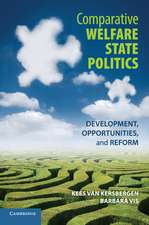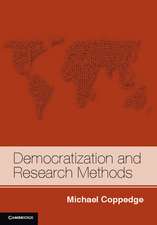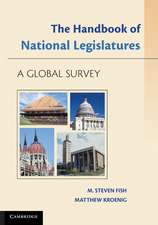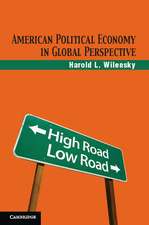The Political Economy of Poland's Transition: New Firms and Reform Governments: Political Economy of Institutions and Decisions
Autor John E. Jackson, Jacek Klich, Krystyna Poznanskaen Limba Engleză Paperback – 18 iul 2012
| Toate formatele și edițiile | Preț | Express |
|---|---|---|
| Paperback (1) | 287.07 lei 6-8 săpt. | |
| Cambridge University Press – 18 iul 2012 | 287.07 lei 6-8 săpt. | |
| Hardback (1) | 599.34 lei 6-8 săpt. | |
| Cambridge University Press – 5 iun 2005 | 599.34 lei 6-8 săpt. |
Din seria Political Economy of Institutions and Decisions
-
 Preț: 235.99 lei
Preț: 235.99 lei -
 Preț: 231.82 lei
Preț: 231.82 lei -
 Preț: 177.53 lei
Preț: 177.53 lei -
 Preț: 211.85 lei
Preț: 211.85 lei -
 Preț: 200.87 lei
Preț: 200.87 lei -
 Preț: 306.68 lei
Preț: 306.68 lei -
 Preț: 208.16 lei
Preț: 208.16 lei -
 Preț: 133.60 lei
Preț: 133.60 lei -
 Preț: 295.55 lei
Preț: 295.55 lei -
 Preț: 236.43 lei
Preț: 236.43 lei -
 Preț: 228.38 lei
Preț: 228.38 lei -
 Preț: 265.11 lei
Preț: 265.11 lei -
 Preț: 281.49 lei
Preț: 281.49 lei -
 Preț: 285.37 lei
Preț: 285.37 lei -
 Preț: 279.98 lei
Preț: 279.98 lei - 14%
 Preț: 773.75 lei
Preț: 773.75 lei -
 Preț: 233.38 lei
Preț: 233.38 lei -
 Preț: 247.41 lei
Preț: 247.41 lei -
 Preț: 203.12 lei
Preț: 203.12 lei -
 Preț: 230.33 lei
Preț: 230.33 lei -
 Preț: 286.69 lei
Preț: 286.69 lei - 14%
 Preț: 790.57 lei
Preț: 790.57 lei -
 Preț: 265.32 lei
Preț: 265.32 lei - 11%
 Preț: 554.15 lei
Preț: 554.15 lei -
 Preț: 287.07 lei
Preț: 287.07 lei - 11%
 Preț: 700.20 lei
Preț: 700.20 lei -
 Preț: 273.13 lei
Preț: 273.13 lei -
 Preț: 459.84 lei
Preț: 459.84 lei -
 Preț: 280.35 lei
Preț: 280.35 lei -
 Preț: 260.11 lei
Preț: 260.11 lei - 11%
 Preț: 640.30 lei
Preț: 640.30 lei -
 Preț: 286.89 lei
Preț: 286.89 lei -
 Preț: 247.80 lei
Preț: 247.80 lei - 11%
 Preț: 691.81 lei
Preț: 691.81 lei -
 Preț: 287.48 lei
Preț: 287.48 lei - 11%
 Preț: 641.80 lei
Preț: 641.80 lei - 11%
 Preț: 635.32 lei
Preț: 635.32 lei -
 Preț: 271.01 lei
Preț: 271.01 lei -
 Preț: 265.70 lei
Preț: 265.70 lei -
 Preț: 227.83 lei
Preț: 227.83 lei
Preț: 287.07 lei
Nou
Puncte Express: 431
Preț estimativ în valută:
54.94€ • 57.14$ • 45.35£
54.94€ • 57.14$ • 45.35£
Carte tipărită la comandă
Livrare economică 15-29 aprilie
Preluare comenzi: 021 569.72.76
Specificații
ISBN-13: 9781107405226
ISBN-10: 110740522X
Pagini: 296
Dimensiuni: 152 x 229 x 17 mm
Greutate: 0.44 kg
Editura: Cambridge University Press
Colecția Cambridge University Press
Seria Political Economy of Institutions and Decisions
Locul publicării:New York, United States
ISBN-10: 110740522X
Pagini: 296
Dimensiuni: 152 x 229 x 17 mm
Greutate: 0.44 kg
Editura: Cambridge University Press
Colecția Cambridge University Press
Seria Political Economy of Institutions and Decisions
Locul publicării:New York, United States
Cuprins
1. Why Poland?; 2. The dynamics of the Polish political economy; 3. Creative destruction and economic transitions; 4. The social and distributional costs of transition; 5. Individual attitudes and voting; 6. De Novo job creation and election returns; 7. Liberal economic interests and seat allocations; 8. The political economy after 1997; 9. The political economy of transitions: why Poland?
Recenzii
"Both owing to its content and the intellectual and emotional inspiration behind it, this work is undoubtedly worthy of notice." - Jerzy Hausner, Akademia Ekonomiczna, Krakow, Poland
Descriere
This book examines how new, domestically owned firms contributed to Poland's transition between 1990 and 1997.
